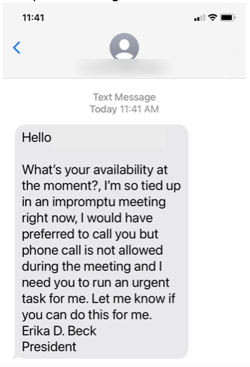What is Smishing?
Smishing is a term used to describe phishing attempts and scams that use text messages or SMS (Short Message Service) as the primary attack platform. It is used to gather different types of personal information, including addresses, credit card information, and more.
Spam texts (also known as phishing texts spam) are messages sent by hackers which attempt to get you to click on a link or divulge personal details such as banking information, credit cards, address, or even your social security number. Scam types vary, but they will all attempt to rope you in with lucrative offers or pretend to be your President to get you to respond!
Spam or fake text messages vary in form and content, but some key guidelines exist to identify text scams. Here are some common examples:
- The message has no relevance to you.
- The message is urgent or needs immediate action from you.
- The text message contains misspellings or poor grammar.
- The text message comes from an unknown phone number or suspicious email address.
- If a text message comes from a lengthy and/or suspicious-looking email address, it is a spam text message.
- The text message contains a suspicious link.
CSUN has recently seen smishing texts that pose as President Beck asking for your availability. The smisher will eventually ask for money. If you get one of these texts, forward it to abuse@csun.edu.
Example of a Recent Smishing Text:
If you receive an unsolicited text from an unrecognizable number, IGNORE or DELETE it. We have received reports of fraudulent text messages purporting to come from President Beck. This is a fraudulent attempt to solicit money. Please DO NOT REPLY OR RESPOND TO THE TEXT MESSAGE. Other CSU campuses are receiving similar attempts pretending to come from their institutional leadership.

Additional Resources
Proofpoint: https://www.proofpoint.com/us/threat-reference/smishing
FCC: https://www.fcc.gov/avoid-temptation-smishing-scams
CISA: https://www.cisa.gov/news-events/news/avoiding-social-engineering-and-phishing-attacks
